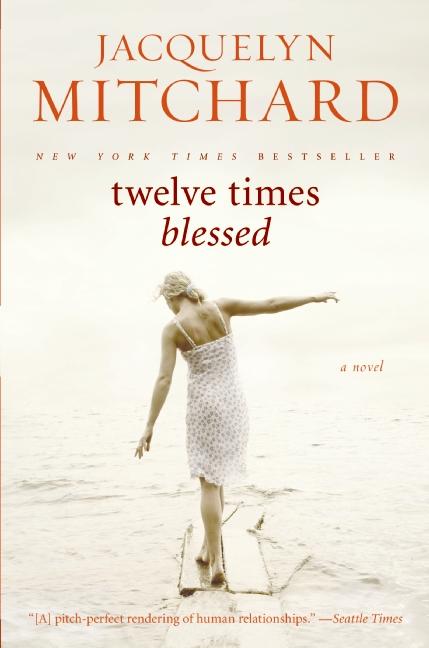Twelve Times Blessed
 Buy the Book: Amazon, Barnes & Noble, IndieBound, Audio
Buy the Book: Amazon, Barnes & Noble, IndieBound, Audio Published by: William Morrow
Release Date: January 27, 2004
Pages: 544
ISBN13: 978-0061715785
Overview
True Dickinson is an entrepreneur who runs a popular and successful baby company online — a service that delivers a present to both mother and baby each month for the first year of the baby’s life. (This company, by the way, now is on the brink of becoming a real company, run by one of my dearest childhood friends). She has a young son from her first marriage, on whom she lavishes all her love, and loyal assistants; but her own personal insecurity and mistrust have stopped her from ever having what she wants most: another love in her life.
All that changes when the younger man she has met earlier on the evening of her 43rd birthday, Valentine’s Day, rescues her from the snowy marsh into which her car has plunged during a Nor’easter on Cape Cod. That True and Hank Bannister are in love is beyond doubt. Whether True and Hank’s love can survive their impulsive marriage, her lack of faith, and True’s scheming mother is another question.
The most like a romance of any of my novels, Twelve Times Blessed is really about the possibility of love between generations, between traditions and on the cusp of a new century — when all the old rules no longer apply and good people struggle to create a set of new ones with which they can live and thrive. True Dickinson has been called the most “annoying” of all my protagonists, because she is insecure though she is successful. But I would argue that these two elements are often mutual in an individual’s life, and even that the very insecurity a person feels can lead her to success in the exterior world, while leaving her hollow in the personal realm. Or perhaps I simply know some really unusual people who are successful — because most of them have a thin crust of absolute confidence that overlays an abyss of self-doubt. The possibility of healing for that kind of person is perhaps an even more important thread in this story.
Praise
“Richly written . . . movingly examines family life, love, and the issue of identity.”
—USA Today
“[Mitchard] perfectly understands women’s insecurities and the minutiae of daily spats. She wrings tension out of every sharp word and awkward hug.”
—People
“Jacquelyn Mitchard brings her pitch-perfect rendering of human relationships to her new novel.”
—Seattle Times